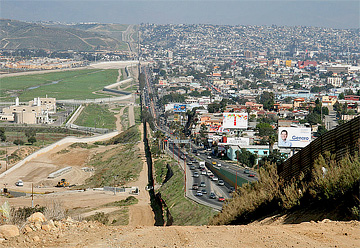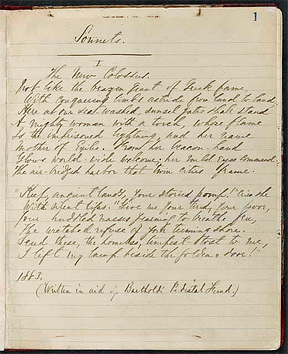Yesterday I began putting up excerpts from the Patheos – Cross Examinations conversation about illegal immigration. Today I’ll put up four other excerpts, along with my own brief comments. If this matter is of interest to you, I would urge you to follow the links to the full articles on the Patheos site.
Kelly Monroe Kullberg is an InterVarsity minister to faculty and graduate students, author/editor of the bestselling Finding God at Harvard, and founder of The Veritas Forum.
Ours is a God who breaks through barriers – and a God who cares about fair dealing and indigenous justice. Grace and truth, mercy and justice, God is too transcendent and too loving to reside in only one part of the equation. So we should be mindful both of welcoming the other and of establishing wise boundaries that defend and serve the communities in which we live. . . .
Naturally, those who honor God and his Word will love the foreigner, the fatherless and the widow. The difficulty comes with the influx of hundreds of thousands of illegal immigrants into a region whose majority population is neither adequately equipped nor enthusiastic to receive them. In this context it’s appropriate to explore what is meant, in Scripture, by the usefulness of hedges and fences, the importance of just weights, and the sheer folly and even sinfulness of those who spend what they have not first saved. Individuals, groups and nations that put themselves in debt, especially severe debt, place themselves in positions of vulnerability and even enslavement to those whom they owe. As the author of the Proverbs tells us, “The borrower is servant to the lender.” At some point, it is neither wise nor right to put ourselves in deeper and deeper debt in order to provide greater and greater benefits to more and more people. We’re first to put our own house in order.
Let’s leave behind the rhetoric and the easy sloganeering and confront the hard task of discernment. Just as Paul taught the Church to delineate among widows in order to find those for whom the Church would provide, we are called, I believe, to make difficult and principled decisions about stewardship and about providing the conditions for healthy flourishing communities that can welcome many strangers not with hostility but with hospitality. With kindness and grace. Obedience to the whole counsel of Scripture yields sustainable growth and goodness to those in need.
Read Kullberg’s entire contribution here.
MDR Comment: Kullberg sees in Scripture a precedent for national boundaries and, apparently, even fences. She challenges us to take seriously our need to be fiscally and morally responsible as a nation. Kullberg reminds us of the complexity of the issue of illegal immigration as we look for biblical guidance.
Glen Peterson is founder and President of the Capacity Partnership Group. He consults with non-profit organizations on matters of leadership and moral governance, and has abundant experience in developing community-based partnerships that serve the poor and the needy.
In the Christian and Jewish narrative of creation, God makes humans in his own image. Immigration cannot be discussed and debated only in the abstract, as it is ultimately about individual people, created in God’s image, who are immigrants. Each of these immigrants has value to God and to people who value what God has created. Christian attitudes and actions toward immigrants, informed by our belief in a common creation and our possession of God’s image, will inform the way we treat all people, immigrant or not.
This possession of God’s image also applies to the self-understanding of the immigrant. Some immigrants think of themselves as inferior to the majority culture in which they live because they may come from a place of economic or educational impoverishment. Immigrants who understand their own intrinsic value become better educated and participate more fully in the economic and cultural life of their new home.
Read Peterson’s entire contribution here.
MDR Comment: Peterson rightly points to the foundational question of how we think about those who have come to the United States illegally. Who are they, essentially? Are they illegal aliens? Are they undocumented workers? Or are they, most of all, human beings who bear the image of God? Our answer to these questions will determine our whole approach to the issue of illegal immigration and the even broader issues of justice of which it is a part.
Matthew Soerens is an immigration and citizenship counselor for World Relief Dupage, and co-author with Jenny Hwang of Welcoming the Stranger: Justice, Compassion and Truth in the Immigration Debate.
Scripture is at the center of why I and so many American evangelicals have become vocal advocates of immigration reform. The Hebrew ger, which most versions of the Bible translate as “alien,” appears 92 times in the Old Testament. The words of Exodus 12:49 are repeated several times throughout the Pentateuch: “The same law applies to the native-born and the alien living among you.” God speaks repeatedly of His special concern for aliens, who are linked with other vulnerable groups such as orphans and widows (Ps. 146:9; Dt. 10:18; Ezek. 22:7; Zech. 7:10). God loves the alien, and commands His people to do the same, remembering their own history (Lev. 19:33-34). That love goes beyond a general sentiment to legislation, which God included in the Law He gave to the Israelites, mandating rules for the harvesting and gleaning of crops and for tithing that were intended to provide for the needs of immigrants (Dt. 14:28-29, 24:19-21).
While the scriptural mandate to care for the immigrant is clear, many Christians wrestle with what to do with those immigrants who have overstayed a visa or entered the country illegally. Romans 13 makes clear that God has established governing authorities and we are called to submit to them.
Read Soerens’ entire contribution here.
MDR Comment: As you’d expect, I am encouraged by Soerens’ effort to ground this conversation in Scripture. He rightly points to biblical passages that seem, at least at first glance, to point in opposite directions with respect to the policies and laws of the United States. How can we show appropriate biblical concern for the “alien” if that “alien” has entered and/or remains in a country illegally?
Miguel de la Torre is professor of social ethics at Iliff School of Theology and author of Trails of Hope and Terror: Testimonies on Immigration.
Let us begin by pointing out that the way in which the questions are formulated betrays Eurocentric biases. The usage of the term “illegal” is not a neutral word; it connotes criminality – that those who are illegal are somehow inherently bad, if not evil. But do we call a driver who is driving without a license an illegal driver? Or do we call a taxpayer who fails to file his documents in time an illegal citizen? Of course not. Not having proper documentations, either as a driver or filing one’s taxes, does n
ot make the person a criminal. The reason migrants without proper documentation are called illegal has nothing to do with their character, or their moral framework; they are illegal because those in power have the legislative authority to impose their definitions on society. This is nothing new. We have a history where the biases of past Americans in positions of power made their worldview the legitimate norm. For most of this nation’s history, it was illegal for blacks to experience the freedom of whites. It was illegal for women to vote. When such laws restrict humans to participate in their full humanity, it is not the individual who is illegal; rather it is the prevailing laws that rob a certain group of people of their dignity that are illegal. And as such, Christians have a moral obligation to disobey such illegal laws. Immoral laws are usually ignored, not out of disrespect for the rule of law, but because the lack of justice erodes compliance. When the people continuously disregard the law, it indicates a lack of consent; and without the consent of the public, laws ceases to hold society together. For this reason, Christians realize that justice and equality toward the least always trumps any laws of nations that disenfranchise portions of the community. Whenever immoral laws are in place, a moral obligation exists to be illegal.
Read de la Torre’s entire contribution here.
MDR Comment: De la Torre’s critique of the word “illegal” points to legitimate problems, but avoids the most obvious meaning of the word “illegal” in the phrase, “illegal immigrants.” They are immigrants who have broken the law in the way they entered and/or remained in the country. But, because de la Torre believes that the immigration laws of the United States are themselves “illegal” (which he uses in a way that apprears to mean “immoral”), he seems not to acknowledge that undocumented immigrants have done anything wrong. I think de la Torre is raising crucial issues here. But his use of language muddies the water rather than making the issues clearer. The rest of his piece is quite engaging, raising historical issues and ethical implications that deserve serious consideration. De la Torre believes that the United States has caused the present immigration dilemma through its unjust practices in Latin America.
Tomorrow I’ll share my contribution to the Cross Examinations conversation of illegal immigration, and begin to offer some reflections that go beyond what I had written earlier.

